- Home
- David Lubar
Sophomores and Other Oxymorons Page 14
Sophomores and Other Oxymorons Read online
Page 14
I did my last bottle drawing in art. I had a whole stack of different drawings, sketches, and paintings, executed in a variety of techniques. We’d done extremely precise blueprint-like renderings, contour drawings, abstract representations, impressionistic wet-brush paintings, and a slew of other things. I’d felt it was stupid, at first, that we were drawing the same objects over and over. But after a while, I started to appreciate that my three bottles were the anchor for all the techniques. If I’d drawn a sketch of three bottles, but then made an abstract collage of a house, followed by an impressionistic watercolor of a basket of apples, I wouldn’t have learned as much about the techniques. Or about the bottles.
November 3
You’d think, after all the books I’ve read, it would be easy to write one. But every time I get an idea, I immediately think up a thousand reasons why it won’t work.
“Your girlfriend can’t save you in here,” Kyle said when we were getting changed for gym the next day.
“What, you want ketchup?” I asked. “I’ve heard it makes jock straps much tastier and easier to swallow.”
“I want you to show me some respect,” Kyle said.
“Sure. I’m happy to,” I said. “How would you like me to manifest that?”
“For starters, you can talk like a person, and not a freaking encyclopedia.”
“You mean, like a dictionary? Or a thesaurus?”
Kyle glared at me. “You used to be a normal kid, back in middle school. I don’t know how you got so messed up. My father’s making a big mistake getting involved with your family.”
“He doesn’t seem to feel that way,” I said.
“Things can change,” Kyle said
“That’s for sure,” I said. “You know there are a thousand other people who’d love to be in business with my dad.”
“Good luck finding one,” Kyle said. He got up and headed out, giving me a push as he went by. I didn’t push back.
November 4
I think I found the perfect idea. And it’s still really early in the month. That gives me lots of time.
I watched election results on the local news that night, but they weren’t covering anything except congressional races, and some scattered politically important campaigns for various mayors and governors. I couldn’t find anything online, either. The next morning, I saw the results in the paper. The voters had killed both the main budget increase and Question Two.
I could have figured that out just as easily by the look on any of my teachers’ faces when I got to school. To use a vocabulary word I hope I never have another opportunity to write, the atmosphere at Zenger High was funereal. When Mr. Franka walked into the meeting room after school, he looked like his dog had died trying and failing to rescue his best friend from a burning building containing the only existing copy of an unpublished novel by H. G. Wells.
“We lost,” he said.
“I know. That stinks,” I said. “Now what?”
“Now there’s no paper,” he said.
“But it’s been published for seventy-five years,” Sarah said.
“The school is named for a newspaperman,” I said.
“They can’t just kill something with all that history,” Jeremy said.
“They just did,” Mr. Franka said.
“So we’re finished?” I asked.
“Soon,” he said. “We can print two or three more issues with the remaining funds. That money is ours. We can maybe stretch things out through the end of December, if we cut costs. But there’s no more money coming.”
“What’s the point?” Richard asked. “That’s like being on life support.”
“There’s a point,” I said. “We can’t quit. We’ll make them the best issues ever.”
“Waste of time,” one of the seniors said. “Bye, guys. It’s been fun.”
He walked out.
As I looked around the table, I had a weird image of people in the Alamo, deciding to stick together in the face of certain death. “Anyone else want to leave?” I asked.
Heads shook in the negative. They were staying.
“Maybe we can print it ourselves,” Sarah said.
I thought about my adventure with the survival manual. I figured it would be cheaper to print a copy of the paper than a whole manual, but we printed a lot of copies. “How much does an issue cost to print?” I asked Mr. Franka.
He told me.
“Wow. That’s a killer,” I said.
“Why don’t we publish online?” Jeremy asked. “We can put it on the school’s server. The cost would be insignificant.”
“That’s a possible solution,” Mr. Franka said.
I thought about how kids would get a copy of each issue and look at it throughout the day. That made it special. There was so much stuff online, and so little in print. “No. We need to preserve the tradition. There has to be a way.” I grabbed a notepad. “Ideas? Say anything that comes to mind, no matter how absurd. Who knows what it could lead to?”
We spent at least half an hour listing everything we could think of, ranging from the practical to the absurd.
Scott Hudson’s (and Friends’) List of Ways to Save the School Paper
Sell ads.
Sell subscriptions for enough money to cover the printing cost.
Rob a bank.
Find a sponsor.
Get a grant.
Sneak into the offices of the local paper and use their equipment.
Win a contest where the prize is a high-speed printer and a year’s supply of toner.
Print everything real tiny so it all fits on an index card.
Write it on our arms and stand in a row in the hall.
Sing it like bards of old.
End each meeting with a fight to the death, and charge admission.
In the end, after things started to move too far out of the box, we ended up with the obvious things in the box.
“My mom makes amazing cookies,” I said.
“Are you suggesting a bake sale?” Sarah asked.
“I guess. Yeah. I am. Her pies are killer, too.”
“We’ll put it on the list,” Sarah said.
We didn’t come up with a better idea. So we all agreed to bring cookies.
I ran into Mr. Franka in the hall after the meeting. He was coming out of the teachers’ lounge, and he looked even more disheartened than he’d been at the meeting.
“What’s wrong?” I asked.
“We lost more than money yesterday. There were some board members who’ve been trying for years to make drastic cuts in areas they consider unimportant. They’ve always been outvoted, five to two, or four to three, when it came to those measures. But three members were up for reelection. Two of our strongest supporters got defeated by people who aren’t on our side. That will swing all the important votes against us.”
“So the people who are against spending money on us are the majority now?”
“I’m afraid so.”
“What else is going to get cut?” I asked.
“I don’t know. We’ll just have to wait and see. But I have a feeling it won’t be pleasant.”
“What about your job?” I couldn’t imagine Zenger High without Mr. Franka.
“I’m in good shape,” he said. “English and math are mostly safe, since they’re required by the state. At least, for now. But art, music, wood shop, all of that could be in danger.”
“That’s just wrong,” I said. “That stuff is important.”
“We both know that. But some people feel differently. There are folks who think the schools should teach nothing except for the basics. There are even people who feel the government shouldn’t be involved in providing an education.”
“That’s just stupid,” I said.
“I agree. But the sad truth
is that if fifty-one percent of the people who bother to show up at the polls vote for stupid, then stupid wins.”
• • •
“We’re having a bake sale,” I told Mom when I got home. “Can you make some cookies?”
Her eyes glowed. “How many do you need?”
One of those super sped-up movie scenes flashed before my eyes, with Mom blurring around the kitchen, zipping from mixing bowl to oven to cooling racks, producing a growing mountain of cookies. “I don’t know. Maybe a couple dozen. Is that doable?”
She was already pulling supplies out of the cabinet. “Piece of cake.”
I detected no irony in her voice.
It wasn’t until she’d set the oven to preheat and started pouring ingredients into the bowl of the electric mixer that she asked, “What’s the sale for?”
“The newspaper,” I said. “We lost the budget vote.”
“Oh . . . I’m sorry. I didn’t get a chance to vote. Was it close?”
She sounded guilty. As much as I was sad she hadn’t voted, I didn’t want her to feel bad. “No. It wasn’t close, at all.” That was the truth. The only people who voted were the ones who didn’t want to pay for all the extra activities and programs. That made sense, in a sad way. People who didn’t mind paying more had less incentive to vote than people who didn’t want to pay more.
“Well, I’ll certainly get you as many cookies as you want.”
“Thanks.”
I called Sarah to coordinate things, and she promised to get in touch with everyone else.
Zenger Zinger for November 4
Last week’s answer: “I deduce that we have to take the left fork of the trail,” John Peter said pathologically.
This week’s puzzle: “Stacked deck for a straight,” John Peter said _________.
NINETEEN
November 5
I didn’t work on my novel, Sean. I was too bummed out about the paper getting killed. And I had to help Mom make cookies. I still think I have a great idea for the plot. I don’t want to tell you about it here. At least, not yet. I’ve heard that if you discuss your idea too soon, you can kill all your creative energy. I’m pretty sure Hemingway talked about that. I’ll get to work on it tomorrow. There’s still almost a whole month left. That’s plenty of time.
We’re pretty lucky Mom loves to bake. And I was lucky she was home last year. She was working when she and Dad met, but she took time off when Bobby was little, and again when I was little. The year before you were born, back when I was in eighth grade, the local economy got real bad. A bunch of places went out of business. Mom had a part-time job, but she gave it up so one of the other workers, who’s a single mother, could get more hours. She’ll probably wait until you’re at least a year old before going back to work. Then, she’ll stick you in a day care with a cigar-smoking woman who’s watching twenty flea-infested kids in her basement. You will scratch and cough quite a lot. I just realized that you won’t even read this until you’re way past that age, and well aware Mom doesn’t do stuff like that. But at least I amused myself.
Thursday morning, I headed off to school with a large box of cookies, and dreams of a self-sufficient school paper. Actually, if we funded it ourselves, maybe it wouldn’t even technically be a school paper. Which would mean we wouldn’t be under the control of any school regulations.
I paused to absorb that thought. Total freedom. We could be like one of those great satirical newspapers from the past that poked fun at everything and fought for social justice.
Jeremy also carried a box. It was pink, wrapped with a white ribbon tied in a bow.
“Your mom didn’t have to get fancy with the packaging,” I said. “We’re selling the individual cookies.”
“That was a sexist assumption. My mom doesn’t bake,” he said. “She’s too busy analyzing the structures of complex proteins.”
“Okay, your dad, then. That’s cool. My friend Patrick’s dad used to make these awesome funnel cakes for us. And he baked the best brownies ever. They moved last year.”
“My dad doesn’t bake, either,” Jeremy said. “So he bought these for the sale.”
“Hey, however we raise the funds, I’m happy,” I said. “Thanks for bringing cookies.”
“Cookies?”
Several kids at the bus stop favored us with lean and hungry looks. I responded with a hands-off stare. It was early enough in the day that nobody was willing to engage in an actual battle for an overdose of sugar.
I noticed Julia had a box, too. “Selling something?” I asked.
“It’s for the chess club,” she said. “We lost our funds. I wish my mom had voted.”
“Good luck,” I said. I wasn’t worried about a bit of competition. There were more than enough snack-hungry sugar-craving students and teachers to support two bake sales.
But not two dozen.
When we got to school, it looked like we’d wandered into an indoor flea market. There were about ten tables crammed into the open area between the front entrance and the auditorium doors. I spotted other tables along the hallways on both sides.
They were all bake sales. There was one for the Academic Challenge team, another for the history club, the poetry club, the debate team, and so on. Even if my cookies were the best ones on the planet, they had little value in this crowded market.
“Back to the drawing board,” Jeremy said.
“Definitely not back to the baking sheet,” I said. “Or the cake pan.”
I shared the cookies with the kids in homeroom.
November 6
My perfect idea fizzled out after three pages, Sean. It had seemed so great, until I tried to make it work on paper. It’s kind of like playing chess. (Which I will teach you as soon as you are old enough not to choke on a pawn.) You reach out to make a move, and then you think about what moves that will lead to, and everything seems great as you look ahead a move or two. But then you get to the third or fourth move out, and all of a sudden, your whole strategy falls apart. The next thing you know, you’re down two pawns and a knight. I’m going to take enough time to come up with a good idea that doesn’t fall apart after three or four moves, and then I’ll really think it through, all the way to the checkmate (to extend the metaphor).
I see now that it was a mistake to dive right in. That’s okay for an essay or a story. But a novel takes a lot of planning. I don’t want to write my way to the middle just to discover I have no idea how to finish it. I’ll give my novel plenty of thought tonight and tomorrow, and then start writing on Saturday. Yeah. That’ll work. There are still a ton of days in the month.
“The football team’s budget never gets cut,” Lee said as we made our way up the bleachers for the Friday-evening game.
“And it never will,” I said. The only thing more sacred than football around here was wrestling.
“Maybe you should tap into their budget. Let the football team fund the newspaper,” she said.
“I think that would be a bit tough,” I said.
We grabbed seats and watched the kickoff. The ball hit just inside the five-yard line. Our kick returner let the ball bounce into the end zone.
“He didn’t catch it and run,” Lee said.
“He played it safe,” I said.
“Last time, he ran with the first kickoff,” she said. “I was looking forward to that.”
“It’s different every time,” I said. “That’s the beauty of it. You never know what will happen.”
“Imagine if stage plays were like that,” she said.
“I think that’s called improv,” I said.
“Oh, yeah. You’re right. Maybe scripts are a good thing.”
We failed to score during that possession. But five minutes later, we recovered a fumble. Two plays after that, we scored from the fifteen with a perfect pass, rifled between a pair
of defenders. I could tell Lee was enjoying the game.
“I can’t believe you’re turning me into a sports fan,” she said. “Next thing I know, you’ll be asking me to the senior prom.” She laughed.
I didn’t.
November 8
All my ideas suck.
I think I need to let things jell in my brain. November’s barely begun. I can do some serious brainstorming this weekend, and then get going on the novel on Monday.
After grappling with my guidance counselor’s suggestion for a while, I decided to take a shot at wrestling. Tryouts were after school on Monday. The gym was packed. Mr. Cravutto had pulled in the other three gym teachers to help, and set up four mats. I beat the first kid I went against, but not by much. The next round, I found myself face to sneer with Kyle.
“You’re going down,” he said.
“Like last time?” I asked.
“No trash talk,” the coach said. He blew his whistle.
Kyle came at me hard. I should have tried to deflect him, but I met him full force. Our heads were jammed close together as we fought for an advantage.
He whispered a threat. “I’ll tell my dad you tried to kiss my sister.”
“Even you wouldn’t sink that low,” I said. Kyle’s sister was in sixth grade. A kid my age would have to be a total predator to try to kiss her. He’d never go through with that threat. And nobody would ever believe it. But the thought broke my concentration.
I was briefly in the air.
And then, briefly, on my back.
I didn’t bother trying to win my next two matches. Even if I was good enough to make the cut, there was no way I wanted to spend a season on a team with Kyle.
Later, in the locker room, I couldn’t help myself. “You wouldn’t do that,” I said to Kyle.
Instead of answering directly, he leered and said, “You always did suck at poker.”
So, yeah, he’d bluffed me. But it was a rotten bluff.
Zenger Zinger for November 11
Last week’s answer: “Stacked deck for a straight,” John Peter said tenaciously.

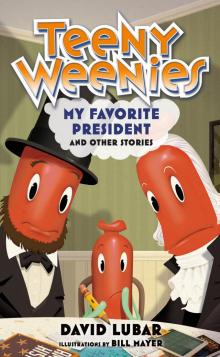 Teeny Weenies: My Favorite President
Teeny Weenies: My Favorite President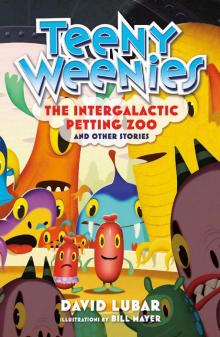 Teeny Weenies: The Intergalactic Petting Zoo
Teeny Weenies: The Intergalactic Petting Zoo Teeny Weenies: The Eighth Octopus
Teeny Weenies: The Eighth Octopus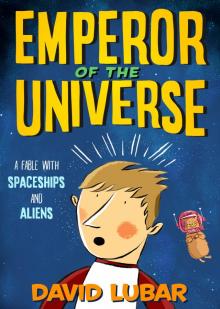 Emperor of the Universe
Emperor of the Universe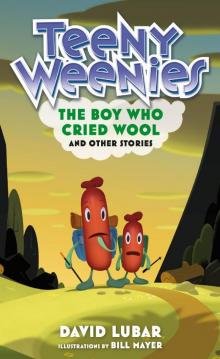 Teeny Weenies: The Boy Who Cried Wool
Teeny Weenies: The Boy Who Cried Wool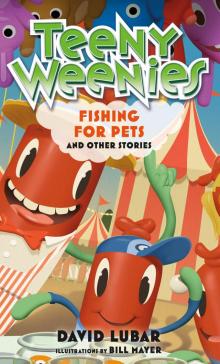 Teeny Weenies: Fishing for Pets
Teeny Weenies: Fishing for Pets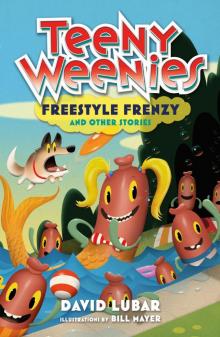 Teeny Weenies: Freestyle Frenzy
Teeny Weenies: Freestyle Frenzy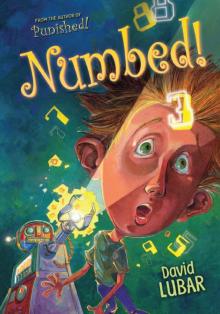 Numbed!
Numbed!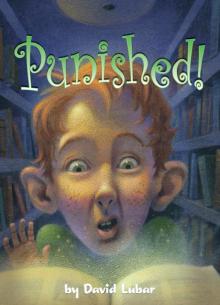 Punished!
Punished!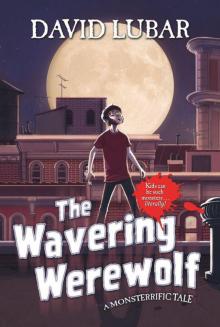 The Wavering Werewolf: A Monsterrific Tale (Monsterrific Tales)
The Wavering Werewolf: A Monsterrific Tale (Monsterrific Tales)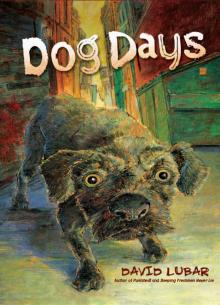 Dog Days
Dog Days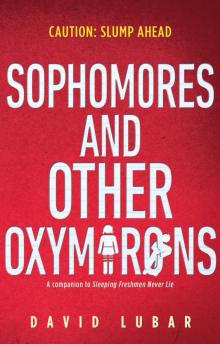 Sophomores and Other Oxymorons
Sophomores and Other Oxymorons The Psychozone
The Psychozone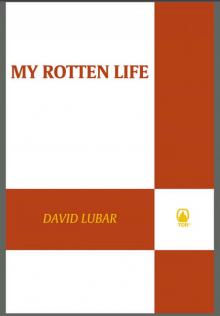 My Rotten Life
My Rotten Life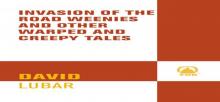 Invasion of the Road Weenies
Invasion of the Road Weenies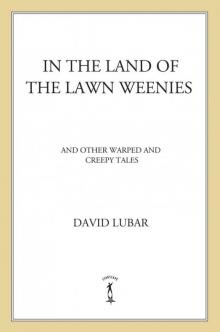 In the Land of the Lawn Weenies
In the Land of the Lawn Weenies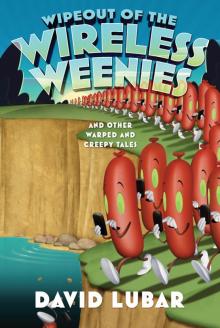 Wipeout of the Wireless Weenies
Wipeout of the Wireless Weenies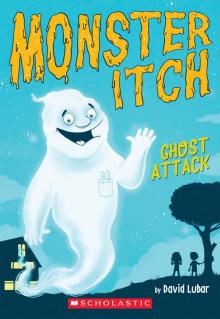 Ghost Attack
Ghost Attack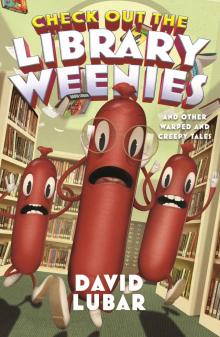 Check Out the Library Weenies
Check Out the Library Weenies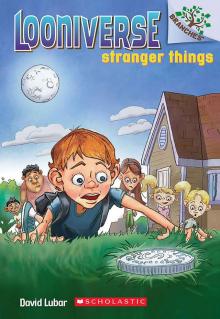 Looniverse #1: Stranger Things (A Branches Book)
Looniverse #1: Stranger Things (A Branches Book)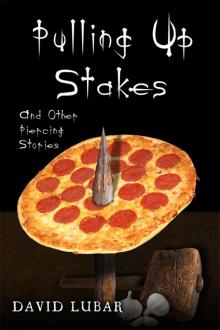 Pulling up Stakes and Other Piercing Stories
Pulling up Stakes and Other Piercing Stories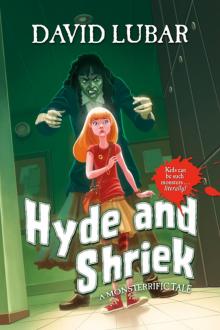 Hyde and Shriek
Hyde and Shriek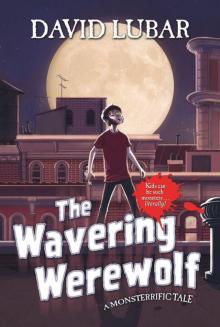 The Wavering Werewolf
The Wavering Werewolf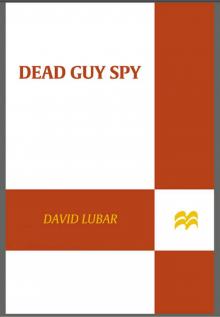 Dead Guy Spy
Dead Guy Spy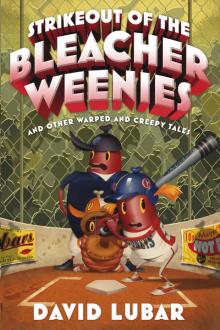 Strikeout of the Bleacher Weenies
Strikeout of the Bleacher Weenies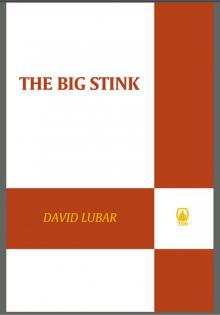 The Big Stink
The Big Stink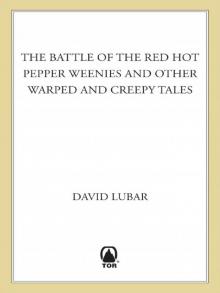 The Battle of the Red Hot Pepper Weenies
The Battle of the Red Hot Pepper Weenies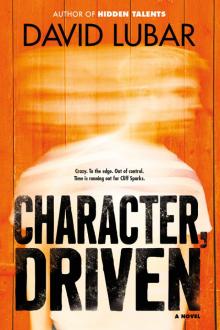 Character, Driven
Character, Driven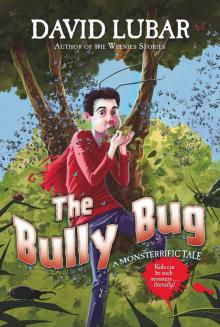 The Bully Bug
The Bully Bug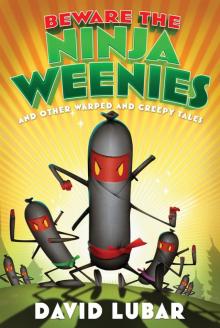 Beware the Ninja Weenies
Beware the Ninja Weenies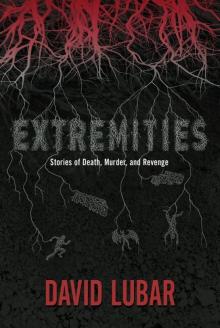 Extremities: Stories of Death, Murder, and Revenge
Extremities: Stories of Death, Murder, and Revenge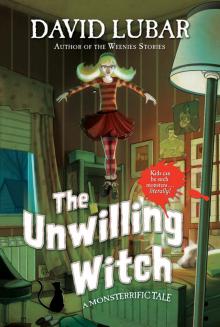 The Unwilling Witch
The Unwilling Witch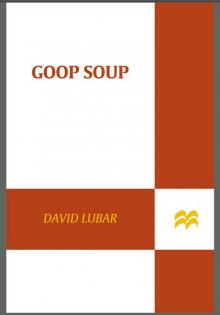 Goop Soup
Goop Soup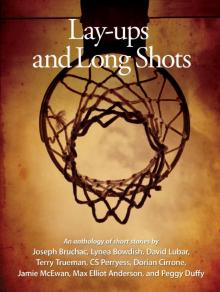 Lay-ups and Long Shots
Lay-ups and Long Shots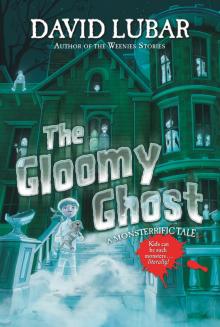 The Gloomy Ghost
The Gloomy Ghost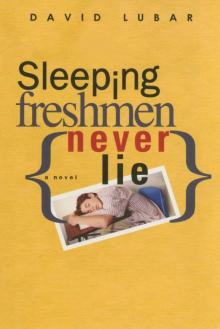 Sleeping Freshmen Never Lie
Sleeping Freshmen Never Lie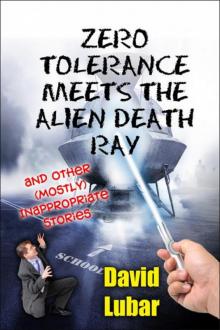 Zero Tolerance Meets the Alien Death Ray and Other (Mostly) Inappropriate Stories
Zero Tolerance Meets the Alien Death Ray and Other (Mostly) Inappropriate Stories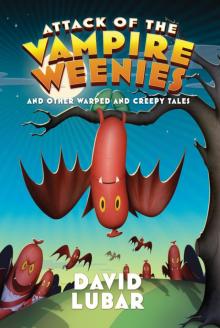 Attack of the Vampire Weenies
Attack of the Vampire Weenies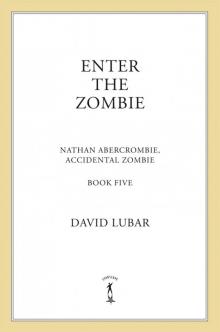 Enter the Zombie
Enter the Zombie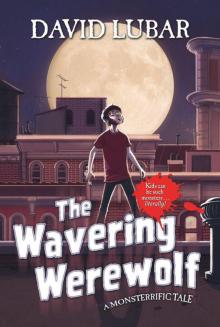 The Wavering Werewolf_A Monsterrific Tale
The Wavering Werewolf_A Monsterrific Tale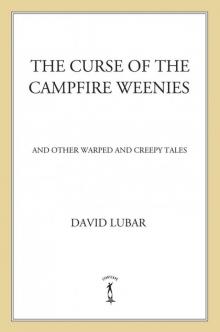 The Curse of the Campfire Weenies
The Curse of the Campfire Weenies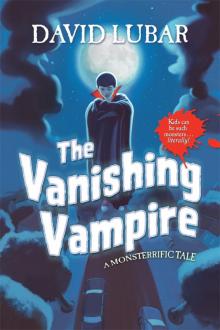 The Vanishing Vampire
The Vanishing Vampire